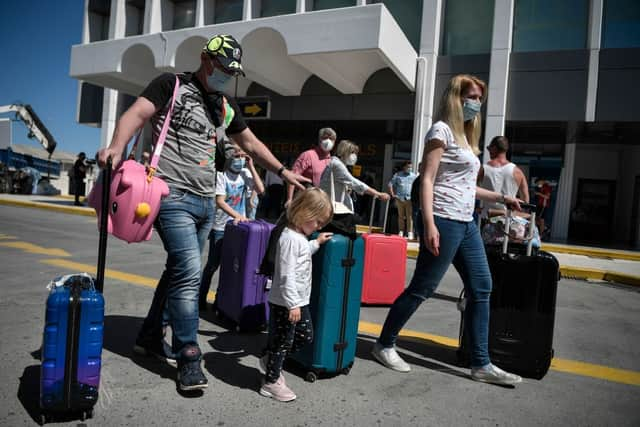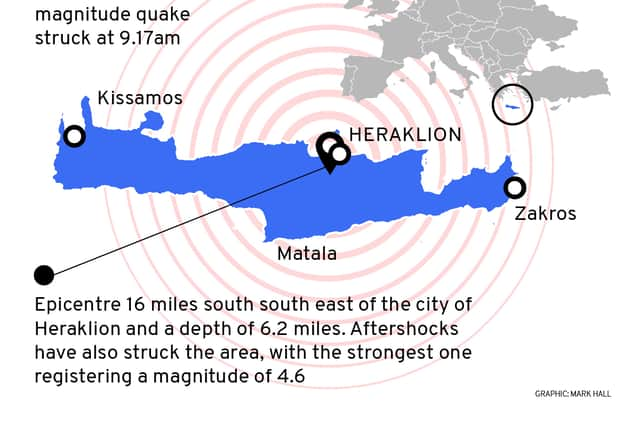Crete earthquake today: where in Greece did earthquake hit, how strong was it and was anyone injured?
This article contains affiliate links. We may earn a small commission on items purchased through this article, but that does not affect our editorial judgement.
and live on Freeview channel 276
The Greek island of Crete was struck by a large earthquake this morning, with schools and hotels being evacuated.
The full effect of the earthquake is still unfolding, with local media reporting damage to buildings and villages close to the epicentre.
This is what you need to know.
Advertisement
Hide AdAdvertisement
Hide AdWhat happened?
At 9:17am local time, an earthquake hit the Greek island of Crete. The European-Mediterranean Seismological Centre (EMSC) gave the earthquake a preliminary magnitude of 6.0, while the Athens Geodynamic Institute gave it a 5.8.
It’s common for different seismological institutes to report varying levels of earthquake magnitudes in the initial hours following an earthquake.


For context, the U.S. Geological Survey (USGS) says that a 5.3 magnitude earthquake is considered moderate, and a 6.3 magnitude earthquake is a strong one.
Several aftershocks came after the initial earthquake, with the EMSC giving a preliminary magnitude of 4.6 for the strongest one.
Advertisement
Hide AdAdvertisement
Hide AdSeismologist Gerasimos Papadopoulos told Greece state broadcaster ERT: “This is not an event that occurred without warning. We have seen activity in this region for several months.
“This was a strong earthquake, it was not under sea but under land and affecting populated areas.”
The earthquake in Crete comes two weeks after a 4.2 magnitude earthquake hit the nearby island of Kos on 11 September.
Was anyone injured?
Speaking to local TV stations, Heraklion mayor Vassilis Lambrinos said that there were no immediate reports from emergency services of any injuries or severe damage.
Advertisement
Hide AdAdvertisement
Hide AdHowever, Greek Reporter states that there has been at least one death following the earthquake, reporting that a 65-year-old was killed when a church collapsed in the village of Arkalochori.
Greece’s Climate Crisis and Civil Protection Ministry also said that at least nine people have suffered from injuries.
Lambrinos added that all schools have been evacuated and are being checked for structural damage.
Holiday goers in Crete were also evacuated from their hotels, with one person telling The Independent: “They’ve evacuated us from our hotel in case there’s a second earthquake - we’re waiting to be taken to a hotel away from the higher buildings.
Advertisement
Hide AdAdvertisement
Hide Ad

“We’ll hopefully be allowed back into the hotel if nothing happens in the next 40 minutes. It was terrifying. Initially there was just a slight rumble, like waiting for a train underground, but it quickly increased causing the building to shake.
“Everyone instinctively got under the tables until we were asked to leave the building. Some people were visibly shaken - one of the chefs collapsed. It was very dramatic.”
What causes an earthquake?
The USGS explains that earthquakes are caused “by a sudden slip on a fault”.
The earth’s tectonic plates are always slowly moving, but they can get stuck, and when this happens pressure begins to build up, and then “there is an earthquake that releases energy in waves that travel through the earth’s crust and cause the shaking that we feel”.
Advertisement
Hide AdAdvertisement
Hide AdThe waves are felt the most strongly at the epicentre, and this is where the most severe damage will occur.
The USGS says that the biggest earthquake in history happened in Bio-Bio, Chile, in 1960.
Known as the Valdivia Earthquake, it happened on 22 May 1960 and various studies have placed the magnitude of the earthquake between 9.4 and 9.6. It lasted for approximately 10 minutes, and the resulting tsunamis affected southern Chile, Hawaii, Japan, the Philippines, New Zealand, Australia and the Aleutian Islands.
A message from the editor:Thank you for reading. NationalWorld is a new national news brand, produced by a team of journalists, editors, video producers and designers who live and work across the UK. Find out more about who’s who in the team, and our editorial values. We want to start a community among our readers, so please follow us on Facebook, Twitter and Instagram, and keep the conversation going. You can also sign up to our newsletters and get a curated selection of our best reads to your inbox every day.
Comment Guidelines
National World encourages reader discussion on our stories. User feedback, insights and back-and-forth exchanges add a rich layer of context to reporting. Please review our Community Guidelines before commenting.
